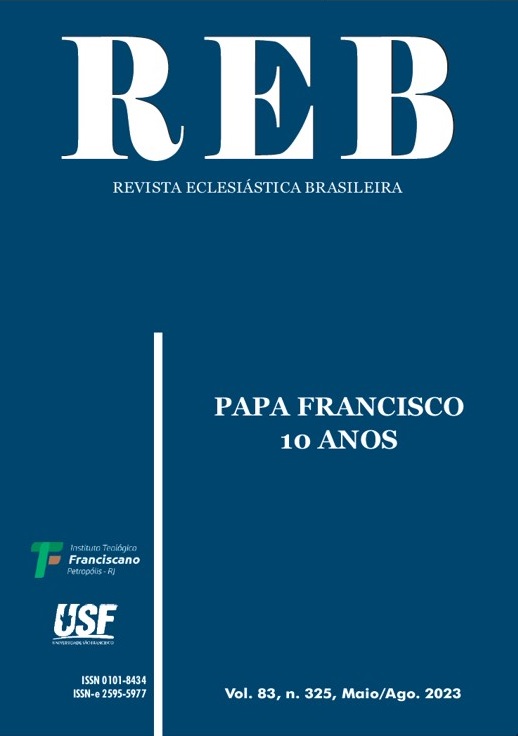Uma idade pós-cristã?
O processo de descristianização e suas consequências
DOI:
https://doi.org/10.29386/reb.v83i325.4887Palabras clave:
Descristianização; Mudança; Época; Crise; possibilidade.Resumen
O presente ensaio parte da consciência da transição epocal que estamos vivenciando e que atinge a todos os setores da sociedade, inclusive a religião. Nesse sentido, são examinadas e analisadas algumas teorias mais significativas até agora elaboradas sobre o fenômeno do pós-cristianismo. Entre elas estão as obras de Charles Péguy, Guillaume Cuchet, Chantal Delsol e Rod Dreher. Além da tese de Charles Péguy que analisa o fracasso da metafísica clássica que o Ocidente adotou para analisar o conteúdo do mistério cristão, os estudos dos demais autores examinados apresentam uma visão nostálgica do cristianismo e interpretam negativamente as mudanças; consequentemente, veem a necessidade de um retorno às origens. O último parágrafo representa a contribuição do autor do artigo: olhar para frente e considerar o pós-cristianismo não como uma passagem de época negativa, mas positiva e capaz de oferecer novas possibilidades para seu desenvolvimento.
Abstract: The present essay moves the starting point from the awareness of the epochal transition that we are experiencing and that is contaminating all sectors of society, including religion. In this regard, some of the most significant theories that have so far been elaborated on the phenomenon of post-Christianity are examined and analyzed. Among these are the works of Charles Péguy, Guillaume Cuchet, Chantal Delsol and Rod Dreher. Apart from the thesis of Charles Péguy which analyzes the failure of classical metaphysics that the West has adopted to analyze the contents of the Christian mystery, the studies of the other authors examined present a nostalgic vision of Christianity and interpret Christianity as negative and, consequently, they see the need for a return to origins. The last paragraph represents the contribution of the author of the article to look forward and consider post-Christianity not a negative, but a positive, epochal transition, capable of offering new possibilities for the development of Christianity.
Keywords: Dechristianization; Change; Epoch; Crisis; possibility.
Descargas
Citas
BAUMAN, Z. Modernidade liquida. Rio de Janeiro: Zahar, 2005.
BOFF, L. Chiesa, carisma, potere. Saggio di ecclesiologia militante. Roma: Borla, 1984.
CANTALAMESSA, R. Dal Kerigma al dogma. Studi sulla cristologia dei Padri. Milano: Vita e Pensiero, 2006.
CASEL, O. Fede, gnosi e mistero. Saggio di teologia del culto cristiano. Padova: EMP, 2001.
COLLIN, D. Il cristianesimo non esiste ancora. Brescia: Queriniana, 2020.
COMPTE-SPONVILLE, A. Lo spirito dell’ateismo. Introduzione ad una spiritualità senza Dio. Milano: Ponte Alle Grazie, 2007.
CUCHET, G. Comment notre monde a cessé d’être Chrétien. Anatomie d’un effondrement. Paris: Seuil, 2018.
CUGINI, P. A filosofia de Charles Péguy: às origens do pensamento pós-moderno. Dialegesthai. Rivista Telematica di Filosofia [on-line], v. 12, 2010 [publicado em: 12 ago. 2010]. Disponível em: <https://mondodomani.org/dialegesthai/>. Acesso em: 07 dez. 2022.
DELSOL, C. Catholicism after Christianity. Disponível em: <http://www.archicompostela.es/wp-content/uploads/2019/10/Chantal-Delsol-IT.pdf>. Acesso em: 13 set. 2022.
DELSOL.C. La fin de la chrétienté. L’inversion normative et le nouvel âge. Paris: Cerf, 2021.
DELUMEAU, J. Le christianisme va-t-il mourir? Paris: Hachette, 1977.
DREHER, R. Comment être chrétien dans un monde qui ne l’est plus. Le Pari Bénédictin. Paris: Artège, 2017.
GAUCHET, M. Le désenchantement du monde. Une histoire politique de la religion. Paris: Gallimard, 1985.
HEIDEGGER, M. Che cos’è la metafisica? Milano: Adelphi, 2001.
HEIDEGGER, M. Essere e tempo. Milano: Mondadori, 2021.
MACLNTYRE, A. Dopo la virtù. Saggio di teoria morale (1981). 2. ed., Roma: Armando 2007.
MELLO, A. Isaia. Introduzione, traduzione e commento. Cinisello Balsamo: San Paolo, 2012.
MOUNER, E. Feu la chrétienté. OEuvres, V. III. Paris: Seuil, 1961-1962.
MUNIZ, A. Teologia anticolonial. Caminhos do Cristianismo indígena. São Paulo: Saber Criativo, 2021.
NANCY, J.L. Decostruzione del cristianesimo. v. 1: La dischiusura. Napoli: Cronopio, 2021.
ONFRAY, M. Décadence. Vi et mort du judéo-christianisme. Villeneuve-d’Ascq: Flammarion, 2017.
PÉGUY, C. Cartesio e Bergson, Lecce: Milella, 1977.
PÉGUY, C. Casse-cou. In. BURAC, R. (Éd.). Ouvres en prose, Paris: Gallimard, 1961.
PRONTERA, A. Filosofia come metodo. Libertà e pluralità in Charles Péguy. Lecce: Milella, 1987.
RATZINGER, J. Fede, verità, tolleranza. Il cristianesimo e le religioni del mondo. Siena: Cantagalli, 2005.
REALE, G. Per una nuova interpretazione di Platone. Rilettura della metafisica dei grandi dialoghi alla luce delle “Dottrine non scritte”. Milano: Vita e Pensiero, 1997.
REALE, G. Platão. Em busca da sabedoria grega. Milão: Vida e Pensamento, 2019.
ROUSSEAU, A. Pour une sociologie de la crise catholique. France, 1960-1980. Brest: UBO; CRBC, 2015.
SANCHES, S.M.; PURI, A.; REIS, P.R. dos. Teologia indígena cristã. São Paulo: Saber Criativo, 2022.
SCHMITT-EGLIN, P. Le mécanisme de la déchristianisation. Pour mieux comprendre la paroisse rurale de banlieue, son évolution, sa mentalité, ses besoins spirituels. Paris: Alsatia, 1952.
SEEWALD. M. Il dogma in divenire. Equilibrio dinamico di continuità e discontinuità. Brescia: Queriniana, 2020.
TADDEI FERRETTI, C. Ipazia di Alessandria e Sinesio di Cirene. Un rapporto interculturale. Trapani: Il Pozzo di Giacobbe, 2018.
VATTIMO, G. Dopo la cristianità. Per un cristianesimo non religioso. Milano: Garzanti, 2002.
VATTIMO, G. Essere e dintorni. Milano: La nave di Teseo, 2018.
WILKEN, R.L. Alla ricerca del volto di Dio. La nascita del pensiero cristiano. Milano: Vita e Pensiero, 2006.
Descargas
Publicado
Cómo citar
Número
Sección
Licencia
Derechos de autor 2023 Revista Eclesiástica Brasileira

Esta obra está bajo una licencia internacional Creative Commons Atribución 4.0.
Os autores cedem os direitos autorais; como gratificação, a REB oferece dois exemplares ao Autor de um artigo.
A REB adere à licença não comercial (Creative Commons). Portanto, é permitida cópia, distribuição e exibição dos textos, respeitados os direitos autorais e citada a fonte de sua proveniência.


